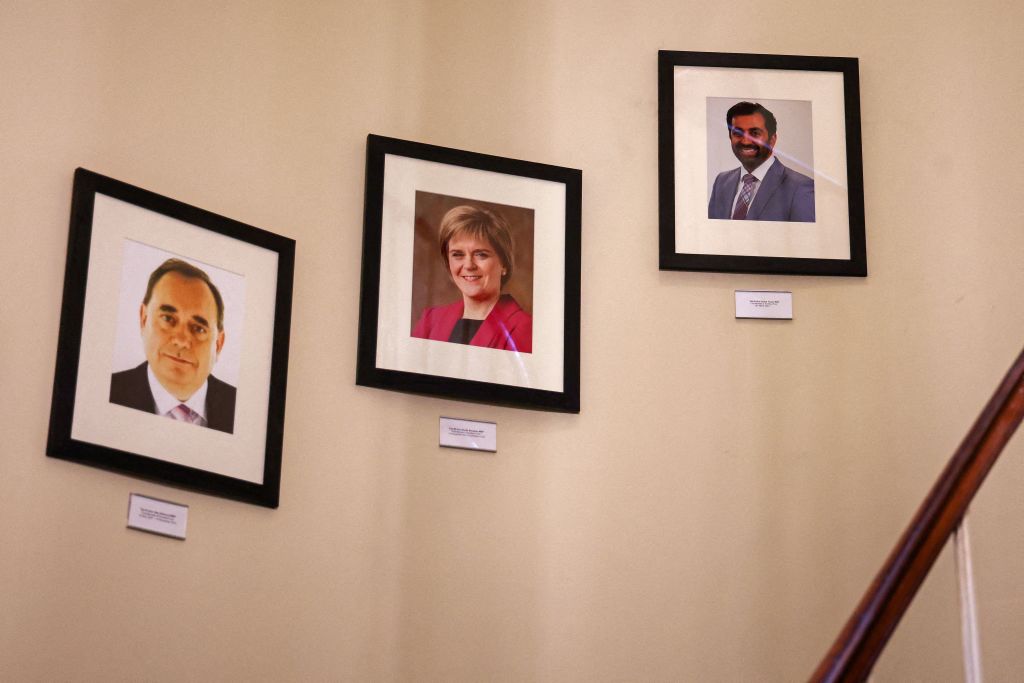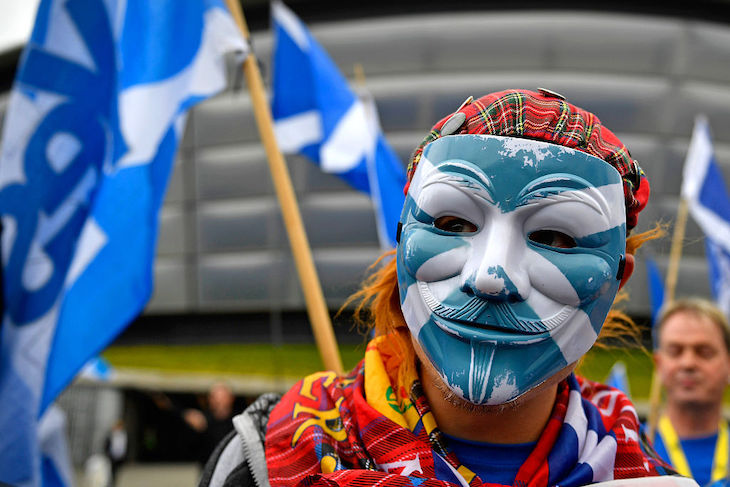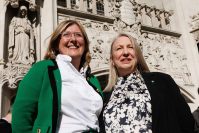Ten years ago today the Scottish independence referendum took place. The result was a resounding defeat for those who wanted Scotland to break away. The decade since has not been kind to the Scottish nationalist project.
It all seemed very different for nationalists on the afternoon of Thursday September 18, 2014
Former SNP leader Alex Salmond, who led the independence campaign, looks a shadow of his former self. Last Saturday, Salmond was ignored by weary shoppers as he addressed a couple of hundred flag-waving supporters in Glasgow’s George Square; meanwhile, current party boss John Swinney gave an interview this week in which he suggested that the independence project’s great hope was an ‘independence generation’ of young Scots. The unspoken part was that elderly Scots are getting in the way of Scotland’s dream of breaking free from England.
As for Nicola Sturgeon? Well, even the selfie-Queen herself knows to keep a low profile, these days.
The nationalists’ fall from grace has been sudden, catastrophic and thoroughly deserved. Things stand to get a lot worse for the SNP which, just a couple of years ago, looked like an unbeatable political force.
It all seemed very different for nationalists on the afternoon of Thursday September 18, 2014. Hours before polling stations closed at 10pm, Salmond was told by pollsters that the Yes campaign had won by 54 per cent to 44 per cent
So confident were the number crunchers in their methodology and results that they went so far as to issue a press release declaring that the Union was over (a couple of stories appeared briefly online before reality collided with Salmond’s dreams). As the first results started to come in, the former First Minister – who’d been rehearsing a statesmanlike victory speech in which he would declare it was time for the nation to move forward as ‘One Scotland’ – realised he had not secured his longed-for place in the history books as his country’s great liberator. Instead, in thunderous mood, he had already begun working on his resignation speech. Salmond had led the Yes campaign to defeat by a margin of 55-45.
But results be damned: within days of their loss, senior SNP figures started behaving as if they’d won. A surge in party membership – membership peaked at over 125,000 at one point – meant incoming First Minister Nicola Sturgeon was treated like a rock star when she took up the job in 2014. Her husband – then party chief executive Peter Murrell – organised a stadium tour across Scotland where enthusiastic Nats could buy Sturgeon T-shirts and mugs. Everyone attending the events looked like they were having a lot of fun. They also, I’m afraid, looked rather deranged.
Buoyed by this wave of adoration, Sturgeon took office with a reputation as a politician of rare and unusual brilliance. This reputation was undeserved, of course, but nationalists aren’t known for their critical thinking.
Sturgeon treated the No voting majority with contempt from day one. She insisted, time and again, that opinion was shifting and that a second referendum would be along in just a moment. Just for good measure, Sturgeon saved a dollop of contempt for her own supporters. She told them, repeatedly, to prepare for a referendum that she had no power to give them. Electoral results kept the faithful happy. When the SNP won 56 of Scotland’s 59 Westminster seats at the 2015 general election, those supporters – understandably – thought they were aboard an unstoppable juggernaut.
Senior SNP figures started behaving as if they’d won
Focused on a constitutional battle she could not win, Sturgeon neglected the responsibilities of her day job. Piddling matters such as a crisis in the NHS, falling standards in schools, and a drug deaths record that shames a modern country were ignored while the First Minister lapped up the adoration of her deluded followers.
When Sturgeon did decide to to drive forward a major new policy, she did not answer the demands of voters, both nationalist and not. Instead, she decided that what Scots were crying out for was a law that could allow men to declare themselves women and enter female safe spaces. Sturgeon became a committed Trans Rights Activist, dismissing as bigots anyone who thought this a foolish idea.
In December, 2022, Sturgeon – with the support of moral cowards who bit their tongues rather than speak out and halfwits who thought saying ‘be kind’ was any kind of answer to the question ‘Why would you let someone with a penis into a domestic violence shelter’ – drove through changes to the Gender Recognition Act which could allow anyone to self-identify into the legally recognised sex of their choosing.

The day of that vote was an opportunity for foolish MSPs to identify themselves. The legislation was so poorly considered and badly written that it was unworkable. Scottish Secretary Alister Jack was already preparing to strike down the fatally flawed new law.
Then, in January 2023, the case of Isla Bryson underlined the reckless stupidity of members of every party (though, to the Scottish Tories’ credit, most of them had voted against self-ID). Bryson, while living as Adam Graham, had raped two women. After conviction, he’d been sent to a women’s prison. So captured were Scotland’s institutions that they were acting as if self-ID was already on the statute books.
Sturgeon exposed her intellectual – and moral – shortcomings when asked whether Bryson/Graham was a man or a woman. This individual, she said, was a rapist, as if this were some third sex.
Many in her party had already decided that Sturgeon’s proposal – that the next General Election should be treated as a ‘de facto’p referendum – showed she was losing the plot. The case of Bryson/Graham did nothing to reassure them about what had happened to their once glorious leader.
In February 2023, Sturgeon announced her decision to stand down. Her successor, Humza Yousaf, took office as a police investigation into allegations of financial impropriety in the SNP intensified. Soon, he was on TV answering questions about the fact police had raided the home Sturgeon and Murrell share in Glasgow.
Then came the arrest and – in the case of Murrell – charges. Sturgeon remains under investigation and both deny wrongdoing.
Yousaf’s decision to end the SNP’s power-sharing Greens backfired and he found himself facing a confidence vote that, although not binding, he was set to lose, humiliatingly.
Ageing No voters are not being replaced by bright unquestioning Yessers
Yousaf quit in May this year and John Swinney – who had shown himself a very poor leader during an earlier stint between 200-04 – came to the rescue of his party, just in time to prepare his party for the General Election. Nationalists returned just nine MPs while Scottish Labour, once thought slain by the SNP, sent 37 new MPs to the House of Commons.
Polls show that the SNP’s support continues to slide, but that reality doesn’t yet seem to have penetrated nationalist skulls. Last Saturday, at a dismal little event in Glasgow, Salmond told a few Yes campaign stragglers that ‘the tide was rising’ in support of independence. A decade after the referendum, many people were ‘ready for battle, again’, he added. Yeah, right.
His successor, John Swinney, is also heading for disappointment. The current First Minister has said that polling indicates that 63 per cent of under-35s support independence. This was, he suggested, proof that the battle was not lost. In time, those Scots would become the majority and the Union would be doomed.
The problem with this prediction is that, over the last decade, a lot of Yes voters have grown up and out of nationalism. Since 2014, around half a million Scots have died; many of them were No voters, who did not want to see the Union broken up. If younger Scots are fully committed to the nationalists’ project, this simple fact of life and death should have seen support for Independence soar. This has not happened.
In fact, the position of Scots on the constitution remains broadly as it was on 18 September 2014..
Ageing No voters are not being replaced by bright unquestioning Yessers. Instead, a large number of those young nationalists are growing up too and realising that the risks of breaking a 300-year-old Union far outweigh the benefits promised by populists such as Alex Salmond, Nicola Sturgeon, and John Swinney.
The future looks bleak for the SNP. And things stand to get a damned sight worse before they get better. Salmond, Swinney and Sturgeon might keep insisting independence is just a rush and a push away but those claims grow more laughable by the day.








Comments